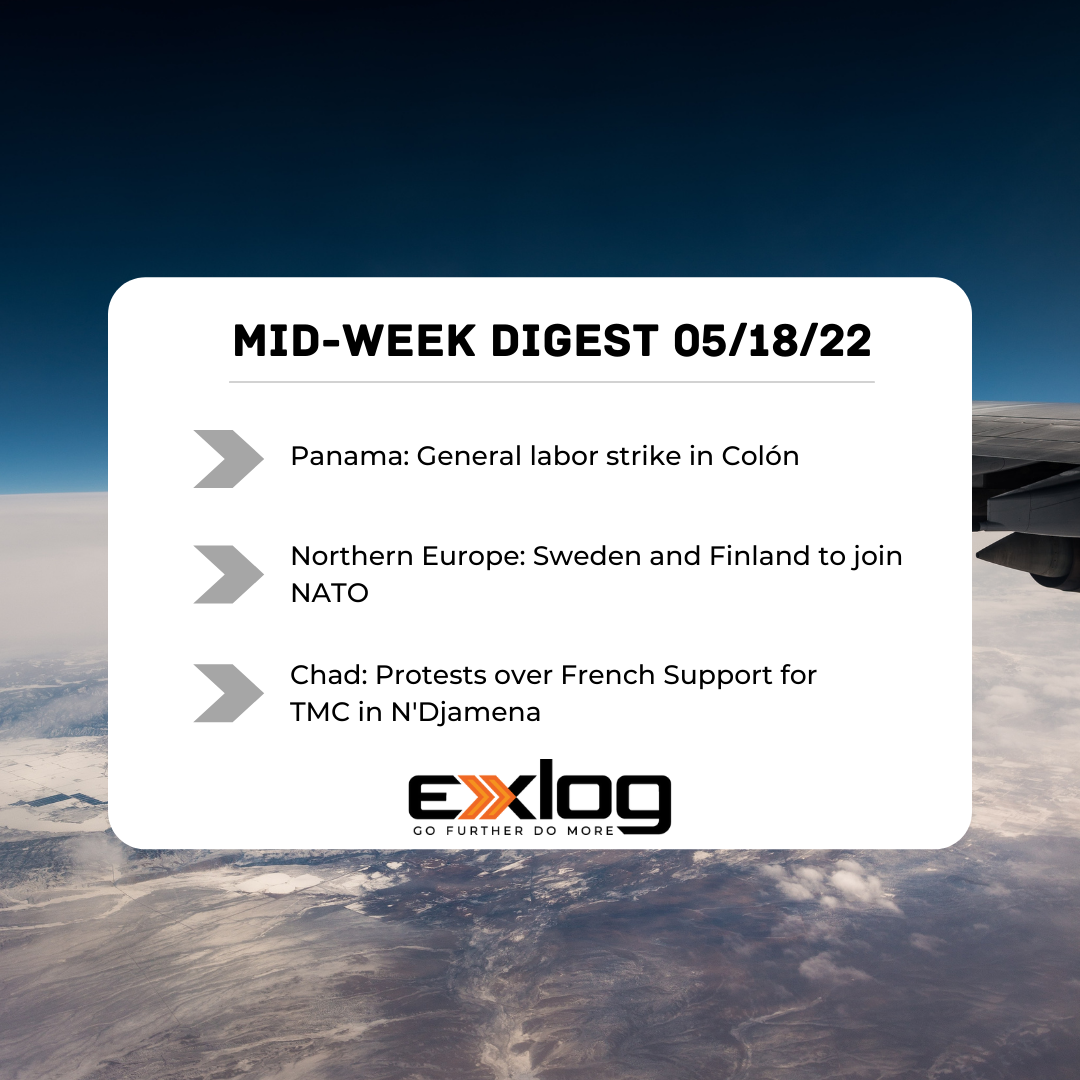Labor strike in Panama’s Colón, Sweden and Finland to join NATO, and Worsening unrest in N’Djamena
Panama: General Labor Strike in Colón
A general strike organized by several labor groups has been ongoing in Panama’s Colón Province since May 9, sparking disruptive protests and interrupting travel and business activities. Participants have demanded solutions to high unemployment, rising prices of fuel and basic goods and investment in the province’s medical infrastructure, education and housing. Demonstrators blocked several roads with burning tires in the city of Colón between May 10 and 12, and isolated incidents of looting have been reported. Clashes between protesters and security forces occurred during several demonstrations last week, leaving two police officers injured and leading to the arrest of at least 15 people. While the majority of the protests have so far been concentrated in Colón, two demonstrations occurred in Panama City, in Coco del Mar and on Via Argentina on May 10 and 12, respectively. In addition to local traffic disruptions, intercity travel between Panama City and Colón has also been interrupted due to the work stoppage by transportation workers –local media reported congestion at the Albrook bus terminal in the capital. Despite Colón’s sizeable contributions (16.9%) to Panama’s GDP –second largest after the province of Panama (59.7%) –labor unions have complained about inequality, poverty, 30% unemployment rate among the local population and the lack of government initiatives to address these issues. On April 12, President Laurentino Cortizo vowed to implement a local employment program and start construction of a hospital, but these preliminary solutions have failed to end the strike. Organizers are likely to stage additional protests that could spread to neighboring provinces and Panama City. Disruptions to government operations, business activity, public and private transportation are likely as demonstrators are expected to congregate in the vicinity of government buildings, city centers and key roadways. Further acts of violence in the form of clashes between security forces and protesters cannot be fully ruled out, particularly if demonstrators obstruct traffic and refuse to disperse.
Northern Europe: Sweden and Finland to join NATO
Finland and Sweden have submitted formal membership applications to the North Atlantic Treaty Organization (NATO), marking one of the most significant developments in the region’s strategic security posture in decades. Finnish President Sauli Niinisto has stated that Russia’s invasion of Ukraine has “altered the security environment” and prompted the decision to join the alliance despite the long-standing military neutrality maintained by Helsinki to sustain regional peace with Russia, which shares a 1,300-kilometer (807 miles) border with Finland. In Sweden, the majority of legislators have also backed the application including members the ruling Social Democratic Party who have long opposed NATO membership. The decision has prompted a contradictory response from Kremlin –Deputy Chairman of the Security Council Dmitry Medvedev threatened nuclear escalation, while Russian President Vladimir Putin claimed on May 16 that the expansion of NATO “does not pose a direct threat to Russia.” Nevertheless, two Finnish diplomats were expelled from Russia on May 17, while Russian state-sponsored energy company Inter Rao halted energy supplies to Finland three days earlier. Russian power export cuts will likely have a limited impact on Finland, considering only about 10% of the country’s energy needs rely on Russian supplies. It is worth noting that the stoppage of power supply is more directly linked to Finland’s inability to transfer payments due to Western sanctions, rather than a retaliation for its intentions to join NATO. Public support for NATO membership has been steadily rising since the invasion of Ukraine –support among the Finnish population has increased from 30% to 80%, with Swedish opinion polls indicating a similar approval rate. Most NATO members have also expressed support for the two Nordic countries joining the alliance. However, Turkish President Tayyip Erdogan stated his opposition to the new members on May 16, citing arms embargoes imposed following Turkey’s operations in Syria in 2019 and accusing Finland and Sweden of harboring members of the Kurdistan’s Worker’s Party (PKK) –a militant group recognized as a terrorist organization by Ankara. Both Finland and Sweden have refused extradition requests for PKK members as Western officials have viewed Kurdish fighters vital allies in the battle against the Islamic State of Iraq and Syria (ISIS). While NATO Secretary General Jens Stoltenberg –as well as the US and the UK –have reiterated support for Sweden and Finland, Turkey’s opposition could prolong the ratification process to up to a year as the legislatures of all 30 NATO countries must unanimously approve new applicants. Should Finland and Sweden obtain NATO membership, both countries will receive security guarantees from other NATO states in case of an unprovoked attack by Russia or any other adversary. While Russia’s initial reactioninvolved unspecified military and diplomatic threats, Kremlin spokesperson Dmitry Peskov has clarified that one plausible response scenario involves Moscow repositioning its forces in western regions if the alliance boosts military infrastructure in Finland and Sweden.
Chad: Protests over French Support for TMC in N’Djamena
Hundreds of people gathered in Chad’s capital N’Djamena and the surrounding cities on May 14 to protest France’s support of the Transitional Military Council (TMC) that unconstitutionally took power following the death of former President Idriss Deby, demonstrating mounting frustration with Paris’s political influence in the country. The recent demonstrations are the latest in a series of protests over military rule that have swept the country since Deby’s death in April 2021. Protesters blocked several streets with burning tires and vandalized several French-linked businesses in the capital –including seven petrol stations operated by French oil and gas company Total Energies. Some demonstrators burned French flags and raised a Russian flag in central N’Djamena, underscoring a pro-Russian sentiment that has been observed in other countries in the region. Security forces responded with tear gas and water cannons, and 12 police officers were injured in clashes with the protesters. There are conflicting reports on casualties among demonstrators –pro-government sources indicated that there were no arrests or casualties among civilians, while other media outlets claimed that several protest participants were wounded. Five opposition leaders with the civil society coalition Wakit Tamma –the group in charge of organizing the rallies –have also been arrested since the recent protest. Anti-French sentiment has continued to escalate in Chad –and the broader Sahel region –due to France’s continued support for unpopular leaders and its apparent political agenda in western Africa. Similar anti-French protests have occurred in Burkina Faso, Mali, and Niger in recent months. The relationship between Chad and France has continued to deteriorate as the Transitional Military Council, led by late president Deby’s son Mahamat Idriss Deby, has delayed a national dialog –intended to serve as a reconciliation conference for Chad’s tribal factions –and a democratic election on several occasions. Peace talks are currently underway between the TMC and Chadian opposition groups in Doha; however, little progress has been reported since the initiation of negotiations in mid-March. Protests targeting French-linked property and businesses are likely to continue in the near term unless a democratic election or other political resolution is announced.


